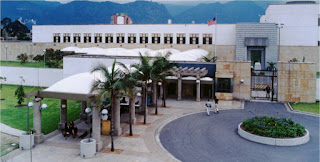What I Didn't Expect to Learn at the U.S. Embassy in Bogotá
I traveled to the U.S. Embassy
in Bogotá in June to take care of some mundane business. What I witnessed was
something much more humanitarian, taking place in and around the U.S.
compound, than I had anticipated.
 |
| https://diplomacy.state.gov/discoverdiplomacy/explorer/places/195812.htm |
On a characteristically brisk Bogota morning, I departed on
foot for the embassy with a coffee in hand wearing, for the first time since
arriving in Colombia (the Caribbean coastal climate is much hotter than the
interior), my jacket that I brought from home. It was only a 10-minute walk to
the embassy. The neighborhood was, for lack of a better word: cool, littered with cafes, artisan beer
bodegas, and well kept dog parks. Though as I approached the more immediate
proximity of the embassy, the environment evolved. Notary shops, travel agencies
and shabby parking lots replaced the boutiques and restaurants, which
accompanied me for most of my walk thus far. The atmosphere was more
reminiscent of the congestion outside a large sporting event than the hip
neighborhood that encircled it. Attendants wearing neon green vest and holding
large signs advertised parking spots, offered visa support, and sold other
services needed for what was clearly a very special day for most of the people
there. Judging from the various license plates, different accents and general
confusion, it was clear that people had journeyed from all corners of Colombia for,
what I would later learn, was their critical U.S. visa interviews.
Well early for my 9 a.m. appointment, I was ushered through
Gate 2, and, while waiting, I listened as security guards directed person after
person to the hectic and busier Gate 1 where visa applicants entered. Inside
the embassy, I saw lines of people standing and waiting, like as if in an
airport terminal, for their crucial visa interviews that, if successful, would
allow them to visit the USA and, if unsuccessful, would mean that all their
efforts up to that day were for no avail.
I thought to myself: all this
for a chance to legally visit the U.S.A? And, to which the scores of people
there that day would have unequivocally answered me: “yes”.
We, as Americans, can take for granted the freedom we have
to migrate or travel for leisure without (much) restriction. This is especially
true to those who choose to exercise this privilege ranging from Peace Corps
Volunteers all the way to high-end international vacationers.
As you can imagine, I often explain to new acquaintance
host-country nationals what Peace Corps service is for the very first time. I
explain that I have come to Colombia to live and work for 27 months, to, which
they often reply:
Them- “Can I go to the U.S to live
and work?”
Me- “Well, yea. Um, I mean, no. Honestly, it
depends.”
Them - nods their head
My Colombian friend, Santiago, once told me he could travel
to only 27 countries without applying for a lengthy and non-guaranteed tourist
visa (though nowadays the number is higher). Moreover, to work or study, the visa
requirements are more stringent.
What I would like to elegantly and honestly tell people when
asked is that it is much harder for a Colombian to do the same in my country as
I do in theirs. Bluntly put, I’m privileged, blessed, lucky, or whatever you
want to call it; I am American.

Comments
Post a Comment